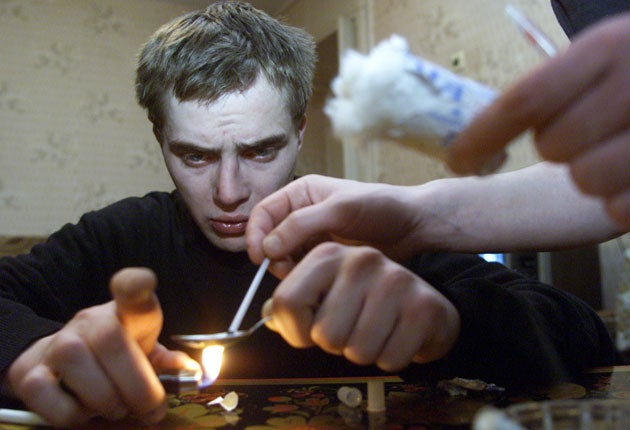The consumer country: Millions of Russian addicts face HIV

Your support helps us to tell the story
From reproductive rights to climate change to Big Tech, The Independent is on the ground when the story is developing. Whether it's investigating the financials of Elon Musk's pro-Trump PAC or producing our latest documentary, 'The A Word', which shines a light on the American women fighting for reproductive rights, we know how important it is to parse out the facts from the messaging.
At such a critical moment in US history, we need reporters on the ground. Your donation allows us to keep sending journalists to speak to both sides of the story.
The Independent is trusted by Americans across the entire political spectrum. And unlike many other quality news outlets, we choose not to lock Americans out of our reporting and analysis with paywalls. We believe quality journalism should be available to everyone, paid for by those who can afford it.
Your support makes all the difference.Sitting right on the route that heroin takes as it makes its way from the Afghan poppy fields to the markets of Europe, Russia has long been blighted by the continent's worst heroin epidemic, with unofficial estimates claiming there could be as many as 2 million people injecting the drug in the country.
Many rights groups and user support networks say Russia needs a humane drugs policy to counter the epidemic, allowing substitution therapy and providing safe injecting equipment to addicts to stop the spread of HIV. Up to one million Russians are already believed to be HIV positive, and the majority of them caught the virus through injecting drugs.
Viktor Ivanov, the head of Russia's Federal Drug Control Agency, says that Russia has to bear the brunt of failed Nato policy in Afghanistan, which has led to the country being flooded with heroin. With Russia blaming the West for the problem, there is little support for what they deride as "Western" methods of treating the addiction. Forced treatment in brutal rehabilitation centres is likely to continue as the main response to the epidemic. Russia is the only country in Europe where substitution therapy is banned, and Mr Ivanov recently told The Independent that it would never be introduced to Russia. "There is no evidence at all to show it works," he said. Advocates of substitution drugs such as methadone and buprenorphine say that's not true. They say that substitution therapy programmes give the authorities a chance to reach out to drug addicts, thus reducing criminal behaviour by addicts who need money for drugs, and giving the opportunity to receive healthcare and treatment. It also means that addicts avoid unsafe injecting practices.
But if anything, the trend is towards hardening the law. So-called "harm reduction" outreach programmes, which would provide heroin addicts with clean needles and syringes, have been all but discontinued in Russia, as international donors pull out now that Russia is seen as an economically stable country not in need of aid, and the Russian authorities themselves refuse to fund such programmes.
Join our commenting forum
Join thought-provoking conversations, follow other Independent readers and see their replies
Comments